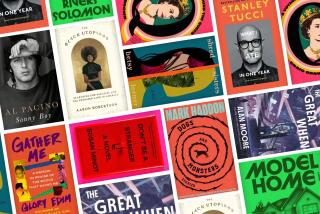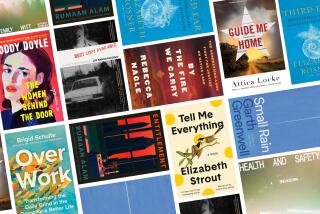A 9/11 book that’s hero-free and human
PARIS — “The only way to know what took place in the restaurant on the 107th floor of the North Tower of the World Trade Center on the 11th of September, 2001,” reads the author’s note of “Windows on the World,” “is to invent it.”
In this daredevil, bestselling book, French author Frederic Beigbeder combines a fictional narrative of a divorced American father and his two young sons, hapless victims of their 9/11 breakfast, with autobiographical musings about the shadows that fateful day has cast upon his own life. A popular and critical success when it was released here in 2003, “Windows on the World” is being published this month in the U.S. by Talk Miramax.
Beigbeder says he and his publisher agreed to revise certain scenes in the English-language version, concerned that they were “more likely to wound” written “in the language in which the tragedy happened.”
He wrote his provocative book in the immediate and highly emotional aftermath of 9/11, and it predated the flood of literary novels that are emerging this year, including Ian McEwan’s “Saturday,” Lynne Sharon Schwartz’s “The Writing on the Wall” and Jonathan Safran Foer’s “Extremely Loud & Incredibly Close.”
When he began, he was “very angry and frustrated by the silence of the American press,” Beigbeder says, sitting behind a wall of unread manuscripts in his office at Flammarion Books, where he works as a publisher in charge of French literature. In addition to being a literary star and leading bad-boy author along the lines of Bret Easton Ellis, Beigbeder publishes a literary journal and appears regularly on French television. “9/11 looked like a Hollywood film. It looked like special effects. Journalists chose not to show the bodies and to just show us two buildings collapsing.”
Comprising short chapters titled with the minutes between 8:30 and 10:29 a.m., Beigbeder’s book asks painful and unimaginable and bitterly funny questions about both the details of the tragedy and the nature of tragedy itself, filling in the emotional blanks of this extraordinary event with his fearless literary imagination.
With smoke filling the room and bodies plunging head first outside the windows, the narrator notes “the barefaced lie” of the sign marked “Emergency Exit.”
He asks himself what various action heroes would do in the same situation and references iconic images from disaster movies -- and it’s not hard to believe that the people on the inside thought the attacks looked strangely like a movie too.
“I think that fiction has the power to show the human side of what is right now just statistics,” he says. “Instead of saying there are 3,000 killed, you choose one person, one destiny, just one human being, with his problems and his questions, having breakfast, eating pancakes with maple syrup, and suddenly there is a Boeing under his feet. This is really a temptation for a novelist. I know it’s obscene.”
“Windows on the World” is a testament to the extent to which the events of Sept. 11 have haunted people around the world, even in countries such as France, where terrorism has been a household word for decades.
“In Western countries, all the rich, privileged people are terrified by 9/11 because they feel threatened,” he says.
These buildings were supposed to be indestructible, invulnerable, and suddenly all this is fragile. So this is a new era. We’re more paranoid now.”
Self-promoter
Beigbeder, a former ad man with a talent for a snappy one-liner and a winning formula, became a literary star with a scathing fictional expose of the advertising world he titled (and sold for) “99 Francs.” A floppy-haired, dandyish champion of self-promotion, Beigbeder courts the media, reads his press and is living proof that there is no such thing as bad publicity -- and that there is.
On television and in person, he can appear almost simultaneously charming and rude, pretentious and self-effacing, frank and disingenuous. Because he is talented, a club-goer, rich and famous with a tendency to embarrass himself (he once hosted a literary talk show in the nude -- it later failed; he passed out in the green room of a late-night chat show after having too much vodka and missed his slot), people routinely get sick of him, and then they fall in love with him again.
He spent four months of the 18 it took to write the book consumed with research, pounding the post-9/11 New York streets. He met witnesses, talked to New York friends, read everything that had been written about the tragedy, surfed the Internet. Beigbeder says he had only been to the setting of his novel once, when it had been transformed into a nightclub for an evening. “It was called ‘The Greatest Bar on Earth,’ ” he remembers with a laugh. “You know, Americans are always very modest.”
In Paris, he breakfasted and wrote the autobiographical passages of the book at Ciel de Paris, the restaurant on the 56th floor of Paris’ highest building, the Tour Montparnasse. “There is the noise of the air conditioner, the clients are half businessmen and half tourists,” he says. “You take an elevator that goes very, very fast. Everything I wanted to know about Windows on the World I had to learn by going there.”
But in many ways Beigbeder’s vision of America had already been formed by his American grandmother, his cousins in New York, adolescent summer trips to tennis camp in Chicago. It seems that he found most of his material by mining the depths of his own consciousness as a Franglais-speaking, America-worshipping, globetrotting citizen of le monde. Like Beigbeder, whose confessional style includes detailed accounts of his own ambivalence and infidelities and failings, Carthew Yorston, the fictional hero of this book, is no hero, with his wavering sentiments and divorced-dad baggage. When one of his sons says, “Look, Dad! See the plane?” there’s no nobility in Yorston’s reaction. “I’d like to tell you my first thought was for Jerry and David,” he says to the reader, “but it wasn’t. I didn’t instinctively try to protect them. When I dived under the table, I wasn’t thinking of anyone except little old me.”
Martyrs, perhaps
“Maybe they are martyrs,” Beigbeder says of the dead, “but they are not heroes. And the terrorists are not heroes. Bin Laden is just another mass murderer. I could find 12 or 15 completely depressed friends who want to kill themselves and organize something like that. That’s why it’s scary.”
The novel, to the annoyance of some French, flows from an extravagant love for the United States. “I am writing this book because I’m sick of bigoted anti-Americanism,” he tells his fellow countrymen in what begins a several-page declaration d’amour for the United States, including lists of his favorite writers and musicians and filmmakers -- all Americans.
He praises America’s work ethic and perpetual cultural renewal, its ability to reconcile inventiveness and accessibility. “When they dream,” he writes, “American artists take the rest of the world with them, because they are more courageous, more hardworking and because they dare to mock their own country.”
But his love isn’t blind: He is critical of what he sees as America’s chauvinism, its cultural isolation and its absence of curiosity about the rest of the world.
“American films, American TV shows, American music and American literature have been a part of my construction,” he says, waving a hand toward photos of Henry Miller and F. Scott Fitzgerald and Truman Capote on his walls.
“People from my generation love America for its culture, hate America for its politics. We feel that we are older and we have helped the Americans to get rid of the British, and in return the Americans have helped us get rid of the Germans. Now we feel just useless!” He laughs. “The French would like to be heard. Nobody is listening to them. We read American novels, but Americans don’t read French novels. So we are very angry about that.”
Beigbeder, whose next novel is set to be published in France on Friday, says he wrote “Windows on the World” for the French, but he hopes that it will offer American readers an outsider’s view. “There will be hundreds of novels about 9/11 in years to come,” he says. “But this one is made by someone who is a foreigner. Maybe it could be interesting to see how other countries look at you. If America discovers that there is a rest of the world, it could be good for America.” Page 1 begins: “8:30 a.m. You know how it ends: Everybody dies.”
More to Read
Sign up for our Book Club newsletter
Get the latest news, events and more from the Los Angeles Times Book Club, and help us get L.A. reading and talking.
You may occasionally receive promotional content from the Los Angeles Times.








